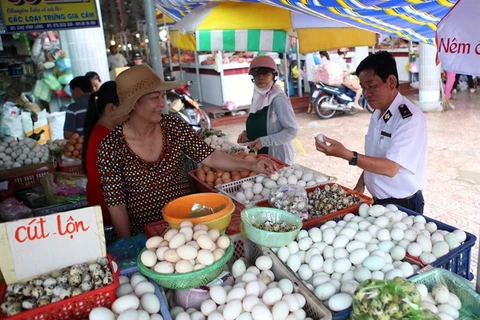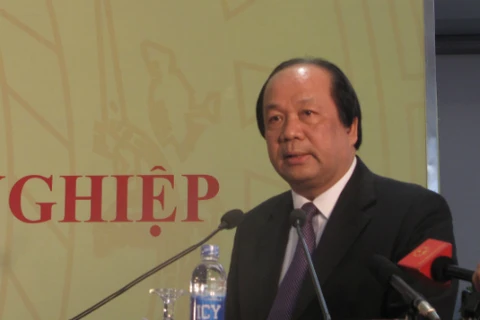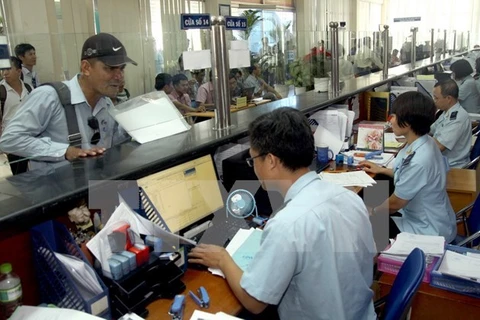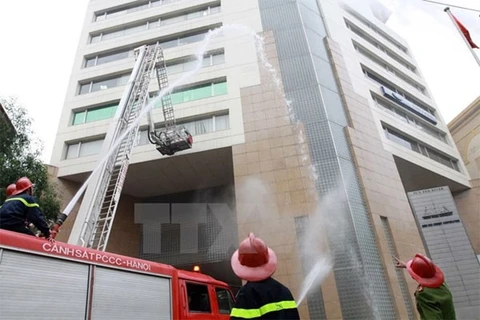Hanoi (VNA) - Deputy Prime Minister Truong Hoa Binh requested that unexpected inspections should increase whilst administrative inspections should target areas with high risk of corruption in the rest of the year.
Deputy PM Binh made the statement at an online conference on July 10 reviewing the inspection sector’s work in the first half of 2017 and setting plans for the second half.
According to the Deputy PM, several inspections had been conducted slowly, some inspections were low-quality and there were inefficiencies in receiving and settling people’s complaints.
“Besides achievements, the State management and law enforcement in some areas remain unsatisfactory, citizens’ complaints and denunciations remain complicated, corruption and wastefulness have not been pushed back and law violations are still found in many areas,” said Deputy PM Binh.
“The inspection sector’s task is extremely hard, especially in dealing with complaints, denunciations and inspections of and fighting against acts of corruption.”
In regard to settling complaints by groups of people, Deputy PM Binh said such complaints must be dealt with justly, while the nature of cases must be precisely assessed to devise proper recommendations for higher authorities.
The work must ensure the interests of the State, people and investors, he said.
He said investors changing land use purpose after they bought it to increase its value was one reason for the slow settlement of some cases.
“We respect investors’ interests. The State should hold development and people’s lives in close association with land rights,” said the Deputy PM.
“Therefore, any settlement must harmonise the interests of all parties involved, local people as well as investors in regard to added values.”
“Planning must be made public and put forward for public opinion. On the other hand, work involving compensation, resettlement and vocational training for local people must improve their lives. Inspection officials must provide effective consultation to complete institutions and exercise social justice, besides dealing with violations.”
Deputy PM Binh underscored that work to prevent corruption must be synchronised, corruption should be strictly dealt with and laws on fighting corruption should be promulgated faster.
Regarding inspections in 2018, Binh called for the Government Inspectorate to detail plans to submit to the Prime Minister for approval, which will be used to develop specific plans to tackle shortcomings in State management, and enforcement of policies and laws.
Inspections in 2018 should focus on pressing issues regarding the management of land, housing, exploitation of mineral resources, environmental protection, investment, construction, financing and banking, settlement of bad debts, market management and counterfeit goods prevention and fighting, tendering for drugs and medical equipment and privatisation of State-owned enterprises, among others.-VNA
Deputy PM Binh made the statement at an online conference on July 10 reviewing the inspection sector’s work in the first half of 2017 and setting plans for the second half.
According to the Deputy PM, several inspections had been conducted slowly, some inspections were low-quality and there were inefficiencies in receiving and settling people’s complaints.
“Besides achievements, the State management and law enforcement in some areas remain unsatisfactory, citizens’ complaints and denunciations remain complicated, corruption and wastefulness have not been pushed back and law violations are still found in many areas,” said Deputy PM Binh.
“The inspection sector’s task is extremely hard, especially in dealing with complaints, denunciations and inspections of and fighting against acts of corruption.”
In regard to settling complaints by groups of people, Deputy PM Binh said such complaints must be dealt with justly, while the nature of cases must be precisely assessed to devise proper recommendations for higher authorities.
The work must ensure the interests of the State, people and investors, he said.
He said investors changing land use purpose after they bought it to increase its value was one reason for the slow settlement of some cases.
“We respect investors’ interests. The State should hold development and people’s lives in close association with land rights,” said the Deputy PM.
“Therefore, any settlement must harmonise the interests of all parties involved, local people as well as investors in regard to added values.”
“Planning must be made public and put forward for public opinion. On the other hand, work involving compensation, resettlement and vocational training for local people must improve their lives. Inspection officials must provide effective consultation to complete institutions and exercise social justice, besides dealing with violations.”
Deputy PM Binh underscored that work to prevent corruption must be synchronised, corruption should be strictly dealt with and laws on fighting corruption should be promulgated faster.
Regarding inspections in 2018, Binh called for the Government Inspectorate to detail plans to submit to the Prime Minister for approval, which will be used to develop specific plans to tackle shortcomings in State management, and enforcement of policies and laws.
Inspections in 2018 should focus on pressing issues regarding the management of land, housing, exploitation of mineral resources, environmental protection, investment, construction, financing and banking, settlement of bad debts, market management and counterfeit goods prevention and fighting, tendering for drugs and medical equipment and privatisation of State-owned enterprises, among others.-VNA
VNA
























